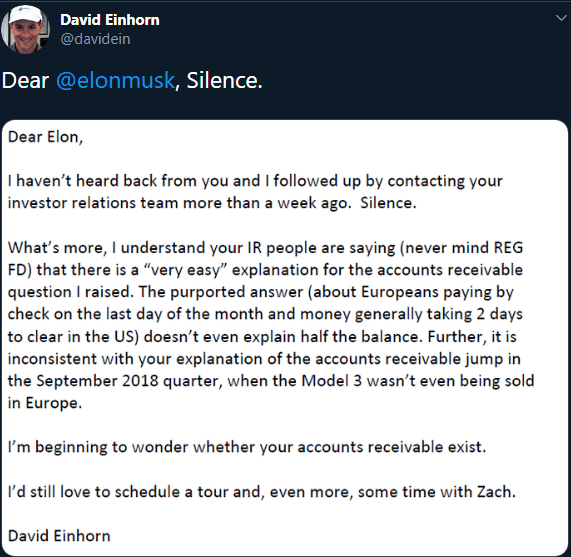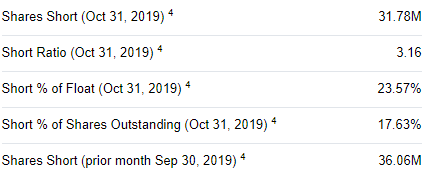Tesla Shorts Fire Back as Elon Musk Mistakenly Declares Victory

Elon Musk made a misleading claim about famed Tesla short seller Jim Chanos. | AP/Ringo HW Chiu
- Musk replied to Twitter user @TeslaTested who claimed Jim Chanos covered his short position after having lost $175 million.
- Jim Chanos has since dispelled the rumors.
- Questions surrounding Tesla’s accounting practices remain unanswered.
CEOs of large cap companies don’t usually spend their time attacking short sellers. They know if their business performs well, it will reflect in the stock price and short sellers will have no option but to cover their positions for a loss. As a result, engaging in a battle with the shorts is considered a waste of time. Tesla CEO Elon Musk, on the other hand, doesn’t fit into these conventional-CEO norms.
Musk has a long history of taunting—or even intimidating—Tesla shorts. His infamous antics include taunting David Einhorn, threatening an anonymous critic with legal action, slapping a short-seller with a restraining order , accusing BlackRock of helping shorts and so on.
In typical Elon Musk fashion, the billionaire tech mogul yet again took to Twitter to taunt famed Tesla short seller Jim Chanos.

Musk mistakenly declares victory over Jim Chanos. | Source: Twitter
In the tweet, Musk was replying to Twitter user @TeslaTested who claimed Jim Chanos covered his short position after having lost $175 million. To be fair to Musk, he probably didn’t know that the tweets—which have since been deleted—were factually incorrect.
Chanos Is Still Short Tesla
On a webcast with Hedgeye , Chanos—who’s renowned for shorting Enron—dispelled the rumors and said:
Tesla is and remains our biggest and the best short positions.
Chanos also reaffirmed his price target of zero and cited insider selling coupled with an executive exodus as reasons behind his conviction. He also brought into question Tesla’s accounting practices and cast doubt on the company’s surprise third-quarter profit.
Chanos’ views on Tesla’s accounting were consistent with Greenlight Capital’s David Einhorn, who has also been a Tesla short for a long time. Here’s what Einhorn said about Tesla’s shady third-quarter numbers :
My understanding of auto sales is that car buyers don’t typically drive off the lot without paying for the car. Publicly traded auto dealers have only a couple of days of accounts receivable balances. Yet, Tesla is owed over $1 billion by its customers. With customers paying up front, why are the balances so high?
Einhorn further posted this on Twitter:

The post from Einhorn caught the attention of the shorts, who pointed out that Tesla’s explanation doesn’t make sense as most countries in Europe don’t use checks in any significant way. In fact, Tesla doesn’t even accept checks in the U.K.
Shorts Are Here to Stay
Musk has a strong desire to get the shorts off his back. However, he has failed to answer the reasonable questions posed by the shorts. Consequently, short interest in Tesla remains high with 23.57 percent of the total float being sold short.

Tesla’s stock has bounced close to 90% in under six months, and it is no surprise that Musk feels that he has defeated the shorts.

However, despite Tesla’s surprise third-quarter profit, the company has still lost close to a billion dollars in 2019 and remains structurally unprofitable.
With questions surrounding Tesla’s accounting practices and high-level executives leaving en masse, it is highly unlikely that shorts like Chanos and Einhorn will be covering their positions anytime soon. The rising stock price may suggest that Musk has won the battle against the shorts, but the war is far from over.